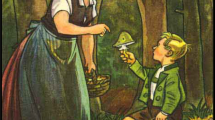Abstract
This paper aims at showing how the New Rhetoric’s insights allow for an integration of argumentation studies in linguistic investigation, and more specifically in discourse analysis. Claiming that argumentativity is a constitutive feature of discourse, it endeavors to explore logos as both reason and language by analyzing patterns of reasoning in their discursive actualization. In this approach, the attempt at influencing the audience’s representations is analyzed in the complexity of a discourse explored in its formal and socio-institutional dimensions.
Similar content being viewed by others
Notes
This approach is not to be confused with Ducrot’s “argumentation in language”: the generalized argumentativity discussed here is inherent to discourse and not to language (“la langue”), and it is part of what Ducrot calls “rhetorical argumentation “(as distinct from his “linguistic argumentation”) (Ducrot 2004).
This aspect has been analyzed in a paper presented at the “Retórica E. Argumentaçao” Conference at Coimbra University, October 2008, entitled “Co-constructing the reasonable : the New Rhetoric in the prism of Discourse Analysis”, forthcoming.
For other presentations of the New Rhetoric’s the contribution to linguistics, see Koren and Amossy (2002).
I will not go here into the complex discussion of normative vs. descriptive approaches to argumentation. It is however clear that my attempt at reconciling the study of arguments with the analysis of discursive argumentativity differs on this point from other, stimulating works with which it has some affinities, like Tindale’s (2004) or van Eemeren & Houtlosser’s developments on strategic maneuvering in pragma-dialectics (2002), where evaluation of arguments’ validity remains a central preoccupation.
La culture française ne survivrait pas à la mort de la culture européenne. Si l'Europe devait se défaire, c'est l'homme européen et l'idée qu'il se fait de la liberté de l'esprit et de la dignité de la personne humaine qui disparaîtraient aussi, parce qu'aucune nation européenne ne serait alors assez forte pour faire entendre sa voix dans le dialogue des cultures et pour s'opposer seule à l'uniformisation planétaire (Sarkozy (2007), Ensemble, p. 93).
Et le troupeau blanc, groupé non sans peine, rentre au logis avec des genoux douloureux, des pieds brûlants et un coeur satisfait. Pourtant le canon mène grand tapage vers la côte 304 sur la droite de Verdun.
References
Amossy, R. 2006 [2000]. L’argumentation dans le discours. Paris: Colin.
Amossy, R. 2005. The argumentative dimension of discourse. In Practices of argumentation, ed. F.H. van Eemeren, and P. Houtlosser, 87–98. Amsterdam: John Benjamins Publishing Company.
Bakhtin, M. 1986. Speech Genres and Other Late Essays. (trans: McGee, Vern W.). Austin: University of Texas Press.
Benveniste, Emile. 1974. Problèmes de linguistique générale 2. Paris: Gallimard.
Blair, T. 2008. The presence of Toulmin and Perelman/Olbrechts-Tyteca for informal logic. Paper delivered at the International Conference of Coimbra, Rhetoric and Argumentation in the Beginning of the twenty-first Century.
Charaudeau, P., and D. Maingueneau (eds.). 2002. Dictionnaire d’analyse du discours. Paris: Le Seuil.
Clemenceau Jacquemaire, M. 1919. Les hommes de bonne volonté. Paris: Calmann Lévy.
Ducrot, O. 1972. Dire et ne pas dire. Principes de sémantique linguistique. Paris: Hermann.
Ducrot, O. 2004. Argumentation rhétorique et argumentation linguistique. In L’argumentation aujourd’hui, ed. M. Doury, and S. Moirand, 17–33. Paris: Presses Sorbonne Nouvelle.
Grize, J.-B. 1990. Logique et langage. Paris: Ophrys.
Koren, R., and R. Amossy (eds.). 2002. Après Perelman. Quelles politiques pour la rhétorique?. Paris: L’Harmattan.
Perelman, Ch., and L. Olbrechts-Tyteca. 1969. The new rhetoric. A treatise on argumentation (Translation of La nouvelle rhétorique. Traité de l’argumentation). Paris: Presses Universitaires de France (1958). Notre Dame/London: University of Notre Dame Press.
Perelman, Ch. 1979. The rational and the reasonable. In The New Rhetoric and the Humanities. Essays on Rhetoric and its Applications, 117–123. Dordrecht/Boston/London: D. Reidel.
Sarkozy, N. 2007. Ensemble. Paris: XO Editions.
Tindale, Ch.W. 2004. Rhetorical argumentation principles of theory and practice. London: Sage.
van Eemeren, F.H., and P. Houtlosser. 2002. Strategic maneuvering: Maintaining a delicate balance. In Dialectic and rhetoric: The warp and woof of argumentation analysis, ed. F.H. van Eemeren, and P. Houtlosser, 119–130. Dordrecht/Boston/London: Kluwer Academic Publishers.
Walton, D. 2000. Scare tactics. Arguments that appeals to fear and threats. Dordrecht: Kluwer Academic Publishers.
Author information
Authors and Affiliations
Corresponding author
Rights and permissions
About this article
Cite this article
Amossy, R. The New Rhetoric’s Inheritance. Argumentation and Discourse Analysis. Argumentation 23, 313–324 (2009). https://doi.org/10.1007/s10503-009-9154-y
Published:
Issue Date:
DOI: https://doi.org/10.1007/s10503-009-9154-y




